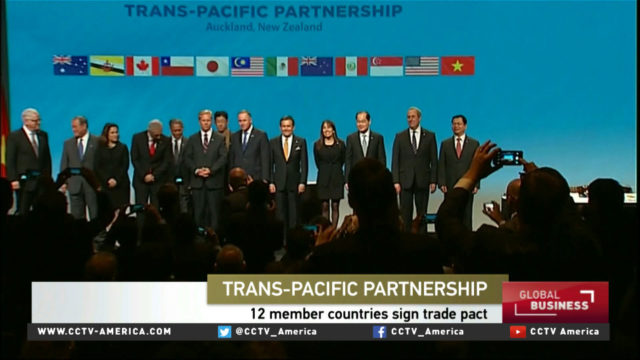The Trans-Pacific partnership is a deal reached between countries that border the Pacific Ocean. It was first proposed in 2006. CCTV America’s Jessica Stone explains what TPP is, and how it influences the countries involved.

The United States and 11 other Pacific Rim countries have all signed the TPP.
The list includes: Australia, Brunei, Canada, Chile, Malaysia, Mexico, New Zealand, Peru, Singapore, Vietnam, and Japan.
On whether China would be welcome to join the TPP, and whether these countries felt disadvantaged by the fact that their largest trading partner is not part of the agreement, trade ministers said:
Vietnam’s Trade Minister said, trade with China is very important for the Vietnamese economy. The trade minister for Vietnam went on to say that there are also many ways to strengthen trade between China and ASEAN, and that ASEAN and China are now negotiating the Trans-Pacific Partnership and discussing China’s willingness to join.
Malaysia’s Minister for International Trade, Mustapa Mohamed said that there is fear that the TPP would hurt Chinese trade, and that for many, China is their biggest trading partner.
This is a concern in Malaysia. Mohamed went on to say that China is now Malaysia’s biggest trading partner, and they don’t see that changing. The way he sees it, in Malaysia TPP will create the momentum for bigger trade opening up in the region.
Malaysia has expressed their openness to other countries coming on board. Mustapa Mohamed said he hopes that more countries will become members of the Trans-Pacific Partnership.
U.S. President Barack Obama claims the TPP will help the American economy. A government website says the agreement will make it easier for U.S. goods and services to be sold, in the fastest growing markets in the world. That will in turn create more jobs and boost growth.
The U.S. president and TPP backers also claim it will protect member country workers by creating strong and enforceable labor laws, and eventually lead to better living standards.
Critics of the TPP say it will be disastrous for the countries involved. The deal has labor, environment and trade advocates very worried.
Sean Miner on the signing of the Trans-Pacific Partnership
CCTV America’s Rachelle Akuffo spoke to Sean Miner, the China program manager and research associate at the Peterson Institute for International Economics in Washington.

Policy analyst Simon Lester on the TPP signing and its implications
CCTV America’s Mike Walter spoke to Simon Lester, trade policy analyst at the Cato’s Herbert A. Stiefel Center for Trade Policy Studies.

Min Ye on TPP signing and its pressure on China
CCTV America’s Mike Walter spoke to Min Ye, the academic coordinator of the Asian Studies Program and assistant professor of International Relations at Boston University.

 CGTN America
CGTN America

